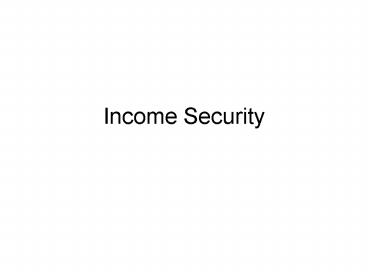Income Security PowerPoint PPT Presentation
1 / 29
Title: Income Security
1
Income Security
2
Income Security
- 2 Types of Benefits
- Cash
- In-Kind (Food Stamps, Nutrition Programs, Housing
Assistance)
3
Income Security
- Two types of eligibility determination
- 1. means-tested programs
- not based on prior payment into a fund but on
need --income and resources - TANF, SSI (means, age and disability)
4
Income Security
- 2. insurance-based programs
- available to people who paid, typically through
payroll deductions, into the funds that maintain
these programs. - Social security, workers compensation,
unemployment insurance
5
Social Security
6
Social Security
- Began with Social Security Act of 1935 to deal
with the financial chaos of the Great Depression.
- Paid retirement benefits to contributing workers
- 1937 began collecting Social Security taxes
- 1939 law changed to add survivors benefits
- 1940 began regular pension payments
- 1956 disability benefits added
Source Rahm 2004
7
Social Security Facts
- Administered by the Social Security
Administration (made independent from the DHHS in
1994) - currently covers 96 of all jobs in the US
- since 1975 benefits have been indexed for
inflation through the use of a Cost of Living
Adjustment (COLA) - the largest program in the federal government
(accounts for nearly 24 cents of every federal
dollar spent)
Source Rahm 2004
8
Soc Sec Proportion of the Budget
Devolution as Seen from the Budget Author(s) C.
Eugene Steuerle, Gordon Mermin Other
Availability PDF Order Online
Printer-Friendly Version Published January 01,
1997 Citation URL http//www.urban.org/url.cfm?ID
307034
9
What Does Social Security Do?
- Today Social Security -
- pays monthly benefits to retirees and people who
are disabled as well as a survivors benefit to
families. - It is a source of income for more than 44 million
Americans
Source Rahm 2004
10
How is the Money for Social Security Raised?
- payroll tax of 15.3 of gross wages
- (employee and employer each pay 7.65)
- the employer deducts 7.65 percent of the
employees earnings, matches that amount, and
sends it to the IRS. (self-employed pay the full
amount) - These taxes collected under the authority of the
Federal Insurance Contribution Act (FICA) enacted
1935. Look Familiar?
Source Rahm 2004
11
Social Security Facts
- FICA tax is paid into three trust funds
- 1. OASI the Federal Old-Age and Survivors
Insurance - used to pay for retirement and survivors
benefits (what is commonly referred to as social
security) - collects the bulk of the funds (10.7 of each
employees gross wages)
Source Rahm 2004
12
Social Security Facts
- 2. DI the Federal Disability Insurance trust
fund - used to pay for benefits to the disabled
- (1.7 of each employees gross wages)
- 3. Medicare
- helps pay for healthcare of elderly
- (2.9 of each employees gross wages)
Source Rahm 2004
13
To qualify for Soc Sec
- accumulate credits associated with your social
security number - earn a maximum of 4 credits per year
- each year amount of earnings needed for a credit
rises as average earnings levels rise - (i.e. in 2001 830 paid into the fund earned 1
credit toward future benefits) - the of credits required for benefits varies by
age and the type of benefits claimed - for most taxpayers it takes 40 credits (approx.
10 years of work) to qualify for retirement
benefits.
Source Rahm 2004
14
To qualify for Soc Sec
- Not everyone earns credits
- many federal and state employees not included
- also excluded railroad workers, children work in their parents business
Source Rahm 2004
15
To qualify for Soc Sec
- Retirement age 65
- Reduced Benefit age 62
- If delay until 70, receive special credit for
each month between 65 and 70 that do not receive
benefits.
Source Rahm 2004
16
The Social Security Benefit
- Benefits vary by how much you pay into the fund
- Typically, receive benefits that approximate 40
of your average lifetime earnings. - Since your wages typically are lower at your
first job and then grow, your average lifetime
earnings are almost certainly lower than your
earned income over the last few years of working
Source Rahm 2004
17
The Three-Legged Stool
- 1. Social Security
- 2. Private Pension
- 3. Personal Savings and Investment
- Unfortunately many over-rely on Soc Sec
- Source Devroye 2003
18
The Present Configuration
- Defined-benefit pension
- Can compute the benefits you will receive based
on payments you make when you are working - An Alternative defined contribution
- where you would make specific payments now and
your benefits would depend on how the stock
market performed
- Source Devroye 2003
19
The Present Configuration
- Pay-as-you go plan
- The payroll taxes paid by todays workers and
their employers are used mostly to fund benefits
for todays retirees.
- Source Devroye 2003
20
The Soc Sec Dilemma
- 2016 begin spending collecting
- 2038 trust fund depleted
- Why?
- Source Devroye 2003
21
- Life expectancy 5 years from 78-83, but SS
benefit age only raised 2 years from 65-67 - See figure 7
22
- The Problem with changing demographics and the
proposed solutions. - See excel spreadsheet
23
http//www.urban.org/Template.cfm?SectionByAuthor
NavMenuID63template/TaggedContent/ViewPublicat
ion.cfmPublicationID8216
24
http//www.urban.org/Template.cfm?SectionByAuthor
NavMenuID63template/TaggedContent/ViewPublicat
ion.cfmPublicationID8216
25
http//www.urban.org/Template.cfm?SectionByAuthor
NavMenuID63template/TaggedContent/ViewPublicat
ion.cfmPublicationID8216
26
http//www.urban.org/Template.cfm?SectionByAuthor
NavMenuID63template/TaggedContent/ViewPublicat
ion.cfmPublicationID8216
27
http//www.urban.org/Template.cfm?SectionByAuthor
NavMenuID63template/TaggedContent/ViewPublicat
ion.cfmPublicationID8216
28
Citation URL http//www.urban.org/url.cfm?ID1000
214
29
http//www.urban.org/Template.cfm?SectionByAuthor
NavMenuID63template/TaggedContent/ViewPublicat
ion.cfmPublicationID8216
30
Citation URL http//www.urban.org/url.cfm?ID1000
214

